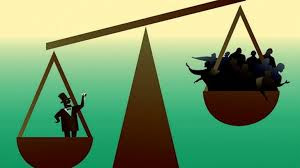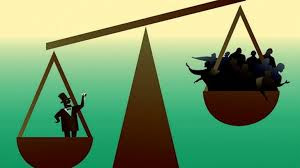 |
| The gap between rich and poor is widening |
Davos
Only eight people have assets equivalent to those of the poorest half of the world, Oxfam said, noting that data from recent years show that the rich are getting richer and the poor getting poorer.
Some may disagree with the methodology used by Oxfam, but even the World Economic Forum in Davos - which deliberately coincides with the Oxfam report - is ringing the bell for widening inequalities.
The Oxfam report was published on Monday, while this week the Davos of Switzerland is hosting the work of the World Economic Forum. The report also points out that new data from China and India show that the poorest half of the world owns even less than previously thought.
Oxfam, which describes the gap as "infamous", said that if the new data had been released earlier, it would have shown that in 2016, nine people owned as much as 3,6 billion of the poorest half of humanity, instead of the 62 people then counted.
By comparison, in 2010, the fortunes of the 43 richest people in the world totaled the poorest 50%, according to the latest estimates.
Inequality has become a major issue in recent years, with the International Monetary Fund and the Pope being among the personalities or entities that have warned of its devastating effects, and anger against elites has sparked a rise in populism in politics.
The Davos Forum itself raised concerns about the issue in a report published last week on global risks.
"We see the expression of so-called anxiety - and clearly Trump's victory and Brexit give new impetus to the issue this year - but there is a lack of concrete alternatives to the status quo," said Max Lawson, Oxfam's chief policy officer. "We can manage capitalism in different ways that could be much more beneficial to the majority of people," he said.
Oxfam called in its report for tougher tax evasion prosecutions, and a shift away from dividend capitalism that unequally distributes its rewards to the already rich.
While many workers struggle with wages that remain stagnant, the wealth of the super-rich has grown by 11% a year, on average, since 2009.
Bill Gates, the richest man in the world who often participates in Davos, has seen his fortune skyrocket by 50% or $ 25 billion (23,5 billion euros) since 2006, when he announced that he was leaving Microsoft, despite efforts to donate its largest share.
While Gates symbolizes how excess wealth can be recycled to help the poor, Oxfam believes that this kind of "big charity" does not solve the real problem.
"If the billionaires have decided to part with their money, that's fine. "But inequality matters, and you can't have a system where billionaires systematically pay lower tax rates than their secretary or cleaner," Lawson said.
Oxfam bases its measurements on data from the Swiss bank Credit Suisse and Forbes magazine. The eight named by the report are Bill Gates, founder of Inditex clothing industry Amantio Ortaga, veteran investor Warren Buffett, Mexican telecommunications entrepreneur Carlos Slim, Amazon CEO Jeff Bezos, Facebook CEO Mard of Oracle technology company Larry Ellison, and former New York mayor Michael Bloomberg.
Source: in.gr
